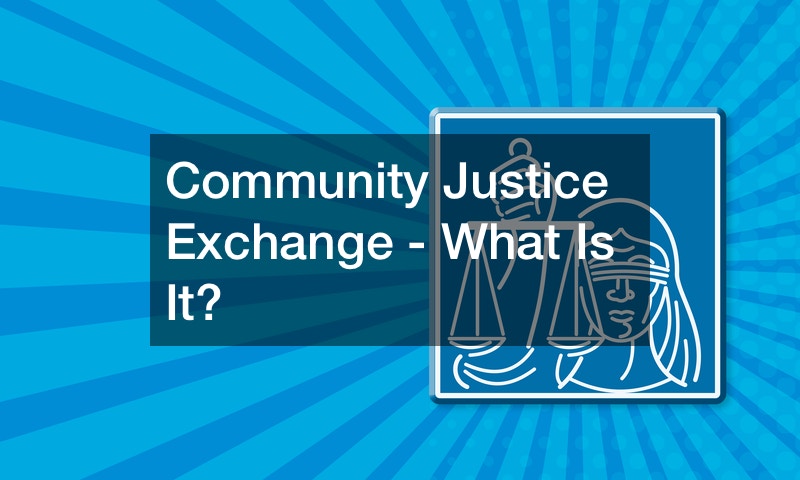

Community Justice Exchange is a public interest organization dedicated to bringing about wholesale change to the American justice system. It develops policies, tests them, and supports groups that share its vision. It helps people who are concerned about the criminal justice system to find like-minded groups and organize to advocate for the elimination of criminal laws, cash bail and bailbonds, and migrant detention.
Here is some background information on Community Justice Exchange and Community Justice Exchange policy.
What is Community Justice Exchange?

Community Justice Exchange is a non-profit organization that believes the American criminal justice and immigration enforcement systems are irretrievably broken. As such, Community Justice Exchange policy is not to reform the system. Instead, its goal is to abolish the system entirely and replace it with a community justice system that reduces crime through policies other than mass incarceration.
The burdens of the existing system fall almost entirely on people of color and the poor. Most of the criminals that are surveilled, investigated, arrested, prosecuted, and incarcerated are lower or lower-middle-class racial minorities. Laws are generally not enforced against upper class and white-collar criminals and when they are, their experience with the criminal justice system is very different from everyone else’s experience.
What Issues Drive Community Justice Exchange Policy?
Some of the ways that the existing system punishes poverty include:
- Cash bail: Cash bail refers to a system where someone arrested for a crime must post cash, or its equivalent, to be released pending trial. Keep in mind that under American criminal law, people who have been arrested are entitled to a presumption of innocence. But under the cash bail system, people who have been arrested are saddled with a presumption that they must remain in jail. This is the opposite of a presumption of innocence. The result of the cash bail system is that poor defendants must remain incarcerated even though they have not been convicted of a crime and even though some of them are innocent of all criminal charges. Some defendants arrested on felony charges may not even be offered bail and must remain incarcerated until trial.
- Immigrant detention: Undocumented immigration happens. The issue that faces every nation is not how to stop it because it cannot be stopped. Instead, nations must develop policies to deal with it. A certain segment of America feels that the best way to deal with undocumented immigration is to create massive detention centers to house the migrant workers, children, and seniors who cross the border without documents. This is inhumane. The system incarcerates immigrants in deplorable conditions without access to a lawyer or law firm. This is also destined to fail. There are many more immigrants who aspire to reap the benefits of living in America than there are detention centers. Immigrant detention is merely a reaction based on economic fear and racial stereotypes.
- Criminalization: Generally speaking, our government’s solution to every societal problem has been to arrest our way out of it. This has failed. Alcohol abuse, drug abuse, theft, stalking, gun violence, domestic violence, and gang violence have all seen their time as the issue of the day with the media and lawmakers. But laws against these antisocial behaviors have not stopped them. Instead, they have created a permanent prisoner class. These behaviors need to end. However, the current approach to writing more laws, enhancing sentences, and increasing enforcement has not fixed the problem. It has, in fact, made it worse. Criminalization prevents people from becoming productive members of society by stigmatizing them as criminals and saddling them with a criminal record that excludes them from government services, drug and alcohol treatment, employment, and housing.
- Mass incarceration: Mass incarceration may place offenders out of sight and out of mind. But mass incarceration helps no one. It is costly for society, prevents people from contributing to society by locking them away and stigmatizing them with a criminal record, and, worst of all, it does not prevent crime. Incarceration is supposed to serve three purposes: punishment, isolation, and deterrence. But incarceration in U.S. jails and prisons just produces criminals with more criminal connections, more lethality, more addictions, and fewer options for legal employment. In addition to its practical problems, mass incarceration is morally wrong. Inmates lose years of their lives for crimes they did not commit or crimes they have not yet been convicted of since they were unable to arrange bail or a bond with a bail bond company. They are victimized by other inmates and correctional officers. They are provided the bare minimum, so private prison owners can maximize their profits. As a result of mass incarceration policies, people of color and poor people are deprived of the very resources that could reduce the crime rate in their communities.
What is the Community Justice Exchange Policy on Crime?

Rather than criminalization, Community Justice Exchange focuses on developing, experimenting with, and spreading ideas for community justice. The key concept behind community justice is grassroots organizing. This enables a two-step process for criminal justice reform.
- Organizing interventions: Participating and intervening in the criminal justice system helps to shift power. The current system is largely conducted out of the view of ordinary citizens. As a result, most people have an idealized view of the criminal justice system. But the current system does allow participation and intervention by those who are motivated to involve themselves in it. Community Justice Exchange policy is to develop and experiment with techniques that shift power in the criminal justice system back to the community. These techniques are shared with other organizations to challenge and contest the criminal justice and immigration systems.
- Developing a replacement vision: The Community Justice Exchange believes in the abolition of prisons and the network of laws and institutions that supports them. This includes the elimination of surveillance, policing, criminal prosecution, and all forms of punitive detention or supervision, whether it be house arrest, parole, probation, or the like. To achieve this, everyone should have what they need to live well and society must have institutions to address homelessness, substance addiction, mental illness, and poverty rather than resorting to law enforcement agencies and prisons to house the homeless, addicts, mentally ill, and poor.
What is the Criminal Justice Exchange Policy on Immigration?

Anyone who has watched the U.S. government’s official policy on immigration knows that the U.S. used harsh, even cruel, policies to scare immigrants from trying to enter the U.S. and evict those already here. Among these policies were:
- Remain in Mexico: Any immigrant crossing the U.S. southern border to request asylum was forced to cross back into Mexico after filing their asylum request. Asylum is a legal status granted to people who faced persecution in their countries of origin. When asylum is granted, the asylum seeker is allowed to reside in the U.S. until conditions at home improve or the asylum seeker gains permanent residency or U.S. citizenship. By forcing asylum seekers to return to Mexico after filing the asylum request, the U.S. exposed the very people asking for protection in the U.S. to physical violence, kidnapping, and extortion by Mexican cartels.
- Family separation: Family separation was implemented specifically to create misery so families would not cross the border. Under this policy, children were incarcerated separately from their parents by U.S. Border Patrol and Immigration and Customs Enforcement (ICE). The goal of this policy was to frighten other families from approaching the U.S.-Mexico border, at the cost of those who already crossed. But the U.S. government lost track of more than 150 parents who were deported while their children remained in custody.
- Mass incarceration: Rather than welcoming immigrants, ICE and the U.S. Department of Holemand Security (DHS) deliberately developed cruel policies to deter border crossings. Adults who were caught crossing the border were neither turned back nor cited and scheduled for an immigration hearing. Instead, they were incarcerated in huge facilities with no right to use bail bond services for release while awaiting deportation. The theory was that they could be treated as criminals since they had broken laws against crossing the border without documentation. But this created a catch-22 because once they were criminally charged with crossing the border, their chances of immigrating legally dropped significantly. Instead, they had to endure indefinite detention, then deportation at the hands of ICE and DHS.
- Border wall: Another of the U.S. government’s deliberately cruel policies was the development of a border wall that creates a risk of serious injury to people crossing the border without keeping them out completely. As a result, people detained indefinitely by ICE and DHS are often injured. But the detention facilities have inadequate medical care and sanitation. This means that the indefinite detention could turn into a death sentence for many immigrants.
Rather than mass incarceration of immigrants, Community Justice Exchange policy is that people have a right to migrate and a right to stay. Consequently, immigrants should not be subjected to cruel policies to make them examples to scare away other immigrants. Instead, immigration laws should not be directed to criminalization and punishment. Rather, they should protect the immigrants’ rights to migrate and remain.
What is the Community Justice Exchange Policy on Bail?

The U.S. Constitution specifically references bail and protects a criminal defendant from unreasonable bail. The founders understood that indefinite detention while awaiting trial was an abuse of power by the police and courts. Bail bondsmen protected people from arbitrary incarceration in England before the U.S. was founded by helping them secure their release until trial.
But now cash bail has exactly the opposite effect by keeping people in jail who cannot afford bail. Instead of providing a way to escape indefinite detention, crowded courts grant bail, but set the amount so that criminal defendants cannot leave jail despite the fact they have not been convicted of any charges.
Think of bail this way. Suppose you are wrongly arrested and jailed. Suppose at your arraignment and bail hearing, the judge sets your bail at $10,000. This amount is fairly modest for a felony charge. But it means that you and your family must raise $10,000 cash or pay $2,000 to a bail bondsman to secure your release.
Suppose that your family cannot raise this money and you remain in jail. Depending on where you live, you might stay in jail for months, maybe even a year, waiting for trial. Since you were wrongly arrested, you choose not to enter a plea bargain and wait that time for your day in court. Suppose you win in court, proving that you were wrongly accused. You won, but lost a year of your life in the process.
Since you were unable to work, you probably lost your job and home. You may have even lost your family if they left while you were jailed and you were unable to work with a divorce attorney.
Despite the obvious unfairness of this situation, this exactly the scenario the law contemplates. In other words, under the current system, nothing wrong happened. The loss of one year of your life is the price the system charges to maintain the cash bail system.
Rather than perpetuating the cash bail system, Community Justice Exchange seeks to end the pretrial detention and supervision system. In the short term, this means supporting efforts to change the practices of detaining criminal defendants prior to trial. This can happen through legislation, court orders, and interventions through the National Bail Fund Network that Community Justice Exchange hosts.
The National Bail Fund Network is an affiliation of like-minded organizations that collect contributions to pay bail for criminal defendants. The homeless and working poor lack the resources to secure bail bonds. The members of the National Bail Fund Network provide a source of reliable bail bonds for those who lack the collateral to secure a bond from the bail bond industry.
Through its dedication to the abolition of the criminal justice and immigration systems, Community Justice Exchange will create a fairer system for everyone.



